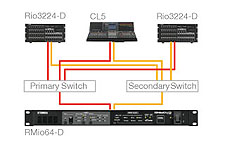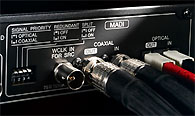|
The ideal audio interface should be essentially unnoticeable. That principle is consistent with the Yamaha
philosophy of absolute fidelity to the original sound. The sound must not change during format conversion in the digital domain, and no added noise can be
tolerated. Performance should not be too dependent on user expertise or skill either. It should be easy to connect devices over any practical distances, and
flexibly work around problems. The RMio64-D Dante/MADI conversion I/O rack is here. It supports a wide range of broadcast and live sound applications with extraordinary flexibility, and without getting in the way.
|
|
 |
Bridging Formats with Seamless Efficiency
Word clock synchronization often becomes an issue when connecting different audio formats, but since the RMio64-D includes built-in sample
rate converters on inputs and outputs, you can simply connect it and forget it without having to worry about noise or dropouts |
| |
|
|

|
Dante Redundancy for Resilient Infrastructure
Audio interruptions must be avoided at all costs in commercial applications. Dante interfaces feature primary and secondary ports that make it easy to set up redundant connections for maximum reliability. If
a cable is accidentally unplugged or a network switch fails, the system will continue to operate without interruption. Alternatively, the dual
Dante ports can be used for simple daisy chain connections (redundancy is not available for daisy-chain connections). |
| |
|
|

|
MADI Redundancy via Alternative Cable Types
In addition to Dante network redundancy, redundant MADI connections can be made via optical and coaxial cables so that if the primary input
signal is interrupted the system automatically switches to the second connection. Optical cables are ideal for long-distance transmission.
|
| |
|
|

|
Dual MADI Connectors Offer More than Just Conversion
Two sets of MADI connections not only facilitate simple conversion between Dante and MADI formats, but MADI signals received via an optical input, for example, can be retransmitted via a coaxial output. So while
converting MADI to Dante, the MADI signal can be simultaneously routed directly to another MADI device. This kind of flexibility is one of the RMio64-D strengths. |
| |
|
|

|
CL, QL, and R: Tight Integration Plus Nuage Support
RMio64-D mounting, Dante patching, and SRC settings can all be remotely controlled from a CL or QL series console touch screen (to be implemented in a future update). The RMio64-D is a standout performer on
its own, and as part of a Nuage system it offers Direct Monitoring functionality for recording, precision VST System Link synchronization, and remote controllability via Nuage Workgroup Manager system management
software. |
|
| Sampling frequency rate |
Internal |
44.1kHz: +4.1667%, +0.1%, -0.1%, -4.0% (±50ppm) / 48kHz: +4.1667%, +0.1%, -0.1%, -4.0% (±50ppm) / 88.2kHz: +4.1667%, +0.1%, -0.1%, -4.0%
(±50ppm) / 96kHz: +4.1667%, +0.1%, -0.1%, -4.0% (±50ppm) / 176.4kHz: +4.1667%, +0.1%, -0.1%, -4.0% (±50ppm) / 192kHz: +4.1667%, +0.1%, -0.1%, -4.0% (±50ppm) |
| External |
44.1kHz: +4.1667%, +0.1%, -0.1%, -4.0% (±200ppm) / 48kHz: +4.1667%, +0.1%, -0.1%, -4.0% (±200ppm) / 88.2kHz: +4.1667%, +0.1%, -0.1%, -4.0%
(±200ppm) / 96kHz: +4.1667%, +0.1%, -0.1%, -4.0% (±200ppm) / 176.4kHz: +4.1667%, +0.1%, -0.1%, -4.0% (±200ppm) / 192kHz: +4.1667%, +0.1%, -0.1%, -4.0% (±200ppm) |
| MADI Channels & Formats |
fs=44.1kHz/48kHz:MADI Single fs 44.1/48k frame, 56/64 channels / fs=88.2kHz/96kHz:MADI Double
fs 44.1/48k frame, 28/32 channels / MADI Double fs 88.2/96k frame, 28/32 channels / fs=176.4kHz/192kHz:MADI Quad fs 44.1/48k frame, 14/16 channels |
| SRC |
SRC Lock Range:38.59kHz – 216kHz / Sample Rate Ratio Limit:6:1 |
| Power requirements |
US/Canada:120V 60Hz, Japan:100V 50/60Hz, China:110-240V 50/60Hz, Korea:220V 60Hz, Other:110-240V 50/60Hz |
| Power consumption |
25W |
| Dimensions |
W |
480mm (18 7/8in) |
| H |
44mm (1 3/4in) |
| D |
374mm (14 3/4in) |
| Net weight |
4.7kg (10.4lb) |
| Accessories |
Owner’s Manual, AC power cord |
| Others |
Operating temperature range: 0 - 40°C, Storage temperature range: -20 - 60°C |
|
|
|